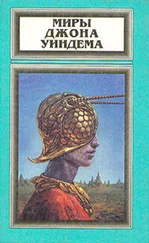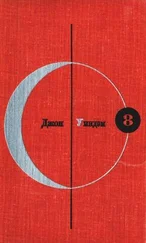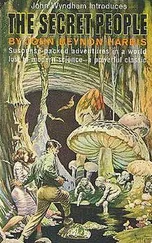Джон Уиндем - Consider Her Ways
Здесь есть возможность читать онлайн «Джон Уиндем - Consider Her Ways» весь текст электронной книги совершенно бесплатно (целиком полную версию без сокращений). В некоторых случаях можно слушать аудио, скачать через торрент в формате fb2 и присутствует краткое содержание. Жанр: Фантастика и фэнтези, на английском языке. Описание произведения, (предисловие) а так же отзывы посетителей доступны на портале библиотеки ЛибКат.
- Название:Consider Her Ways
- Автор:
- Жанр:
- Год:неизвестен
- ISBN:нет данных
- Рейтинг книги:5 / 5. Голосов: 1
-
Избранное:Добавить в избранное
- Отзывы:
-
Ваша оценка:
- 100
- 1
- 2
- 3
- 4
- 5
Consider Her Ways: краткое содержание, описание и аннотация
Предлагаем к чтению аннотацию, описание, краткое содержание или предисловие (зависит от того, что написал сам автор книги «Consider Her Ways»). Если вы не нашли необходимую информацию о книге — напишите в комментариях, мы постараемся отыскать её.
Consider Her Ways — читать онлайн бесплатно полную книгу (весь текст) целиком
Ниже представлен текст книги, разбитый по страницам. Система сохранения места последней прочитанной страницы, позволяет с удобством читать онлайн бесплатно книгу «Consider Her Ways», без необходимости каждый раз заново искать на чём Вы остановились. Поставьте закладку, и сможете в любой момент перейти на страницу, на которой закончили чтение.
Интервал:
Закладка:
"But," I said helplessly, "I know the time. It's my time. This is all distorted."
"The perspective of history must be truer," she told me again, unimpressed, and went on: "But if what happened had to happen, then it chose a fortunate time to happen. A hundred years earlier, even fifty years earlier, it would very likely have meant extinction. Fifty years later might easily have been too late — it might have come upon a world in which all women had profitably restricted themselves to domesticity and consumership. Luckily, however, in the middle of the century some women were still entering the professions, and by far the greatest number of professional women was to be found in medicine — which is to say that they were only really numerous in, and skilled in, the very profession which immediately became of vital importance if we were to survive at all.
"I have no medical knowledge, so I cannot give you any details of the steps they took. All I can tell you is that there was intensive research on lines which will probably be more obvious to you than they are to me.
"A species, even our species, has great will to survive, and the doctors saw to it that the will had the means of expression. Through all the hunger, and the chaos, and the other privations, babies somehow continued to be born. That had to be. Reconstruction could wait: the priority was the new generation that would help in the reconstruction, and then inherit it. So babies were born: the girl babies lived, the boy babies died. That was distressing, and wasteful, too, and so, presently, only girl babies were born — again, the means by which that could be achieved will be easier for you to understand than for me.
"It is, they tell me, not nearly so remarkable as it would appear at first sight. The locust, it seems, will continue to produce female locusts without male, or any other kind of assistance; the aphis, too, is able to go on breeding alone and in seclusion, certainly for eight generations, perhaps more. So it would be a poor thing is we, with all our knowledge and powers of research to assist us, should find ourselves inferior to the locust and the aphis in this respect, would it not?"
She paused, looking at me somewhat quizzically for my response. Perhaps she expected amazed — or possibly shocked — disbelief. If so, I disappointed her: technical achievements have ceased to arouse simple wonder since atomic physics showed how the barriers fall before the pressure of a good brains team. One can take it that most things are possible: whether they are desirable, or worth doing, is a different matter — and one that seemed to me particularly pertinent to her question. I asked her:
"And what is it that you have achieved?"
"Survival," she said simply.
"Materially," I agreed, "I suppose you have. But when it has cost all the rest, when love, art, poetry, excitement, and physical joy have all been sacrificed to mere continued existence, what is left but a soulless waste? What reason is there any longer for survival?"
"As to the reason, I don't know — except that survival is a desire common to all species. I am quite sure that the reason for that desire was no clearer in the twentieth century than it is now. But, for the rest, why should you assume that they are gone? Did not Sappho write poetry? And your assumption that the possession of a soul depends upon a duality of sexes surprises me: it has so often been held that the two are in some sort of conflict, has it not?"
"As an historian who must have studied men, women, and motives you should have taken my meaning better," I told her.
She shook her head, with reproof. "You are so much the conditioned product of your age, my dear. They told you, on all levels, from the works of Freud to that of the most nugatory magazines for women, that it was sex, civilized into romantic love, that made the world go round — and you believed them. But the world continues to go round for others, too — for the insects, the fish, the birds, the animals — and how much do you suppose they know of romantic love, even in brief mating seasons? They hoodwinked you, my dear. Between them they channelled your interests and ambitions along courses that were socially convenient, economically profitable, and almost harmless."
I shook my head.
"I just don't believe it. Oh, yes, you know something of my world — from the outside. But you don't understand it, or feel it."
"That's your conditioning, my dear," she told me calmly.
Her repeated assumption irritated me. I asked:
"Suppose I were to believe what you say, what is it, then, that does make the world go round?"
"That's simple, my dear. It is the will to power. We have that as babies; we have it still in old age. It occurs in men and women alike. It is more fundamental, and more desirable, than sex; I tell you, you were misled — exploited, sublimated for economic convenience.
"After the disease had struck, women ceased, for the first time in history, to be an exploited class. Without male rulers to confuse and divert them they began to perceive that all true power resides in the female principle. The male had served only one brief useful purpose; for the rest of his life he was a painful and costly parasite.
"As they became aware of power, the doctors grasped it. In twenty years they were in full control. With them were the few women engineers, architects, lawyers, administrators, some teachers, and so on, but it was the doctors who held the keys of life and death. The future was in their hands and, as things began gradually to revive, they, together with the other professions, remained the dominant class and became known as the Doctorate. It assumed authority; it made the laws; it enforced them.
"There was opposition, of course. Neither the memory of the old days, nor the effect of twenty years of lawlessness, could be wiped out at once, but the doctors had the whip hand — any woman who wanted a child had to come to them, and they saw to it that she was satisfactorily settled in a community. The roving gangs dwindled away, and gradually order was restored.
"Later on, they faced better-organized opposition. There was a party which contended that the disease which had struck down the men had run its course, and the balance could, and should, be restored — they were know as Reactionists, and they became an embarrassment.
"Most of the Council of the Doctorate still had clear memories of a system which used every weakness of women, and had been no more than a mere civilized culmination of their exploitation through the ages. They remembered how they themselves had only grudgingly been allowed to qualify for their careers. They were now in command: they felt no obligation to surrender their power and authority, and eventually, no doubt, their freedom to a creature whom they had proved to be biologically, and in all other ways, expendable. They refused unanimously to take a step that would lead to corporate suicide, and the Reactionists were proscribed as a subversive criminal organization.
"That, however, was just a palliative. It quickly became clear that they were attacking a symptom and neglecting the cause. The Council was driven to realize that it had an unbalanced society at its hands — a society that was capable of continuity, but was in structure, you might say, little more that the residue of a vanished form. It could not continue in that truncated shape, and as long as it tried to disaffection would increase. Therefore, if power was to become stable, a new form suitable to the circumstances must be found.
"In deciding the shape it should take, the natural tendencies of the little-educated and uneducated woman were carefully considered — such qualities as her feeling for hierarchical principles and her disposition to respect artificial distinctions. You will no doubt recollect that in your own time any fool of a woman whose husband was ennobled or honored at once acquired increased respect and envy from other women though she remained the same fool; and also, that any gathering or society of unoccupied women would soon become obsessionally enmeshed in the creation and preservation of social distinctions. Allied to this is the high value they usually place upon a feeling of security. Important, too, is the capacity for devoted self-sacrifice, and slavery to conscience within the canons of any local convention. We are naturally very biddable creatures. Most of us are happiest when we are being orthodox, however odd our customs may appear to an outsider; the difficulty in handling us lies chiefly in establishing the required standards of orthodoxy.
Читать дальшеИнтервал:
Закладка:
Похожие книги на «Consider Her Ways»
Представляем Вашему вниманию похожие книги на «Consider Her Ways» списком для выбора. Мы отобрали схожую по названию и смыслу литературу в надежде предоставить читателям больше вариантов отыскать новые, интересные, ещё непрочитанные произведения.
Обсуждение, отзывы о книге «Consider Her Ways» и просто собственные мнения читателей. Оставьте ваши комментарии, напишите, что Вы думаете о произведении, его смысле или главных героях. Укажите что конкретно понравилось, а что нет, и почему Вы так считаете.











